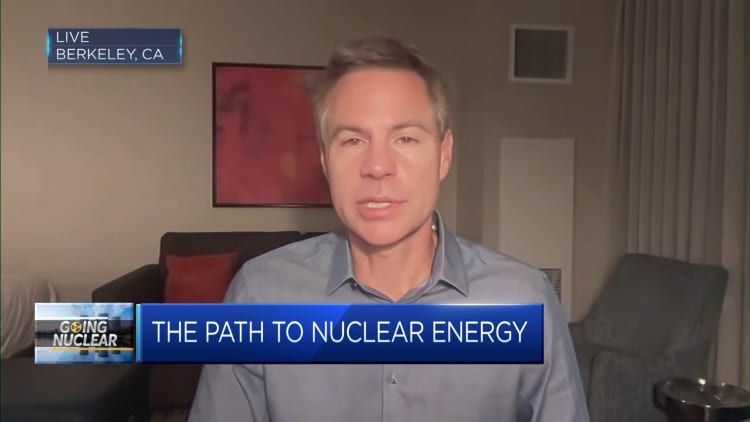Nuclear energy the answer to a sustainable future? Experts are
Nuclear power has been touted as a proven, safe way of producing clean energy, but why isn’t it more widely adopted?
Sean Gallup | Getty Images News | Getty Images
As the world pushes toward its goal of net-zero emissions by 2050, nuclear power has been touted as the way to bridge the energy gap — but some, like Greenpeace, have expressed skepticism, warning that it has “no place in a safe, clean, sustainable future.”
Nuclear energy is not only clean. It is reliable and overcomes the intermittent nature of renewables like wind, hydro and solar power.
“How do you provide cheap, reliable and pollution-free energy for a world of 8 billion people? Nuclear energy is really the only scalable version of that, renewables are not reliable,” Michael Shellenberger, founder of environmental organization Environmental Progress, told CNBC.
Governments have started to pour money into the sector after years of “treading water,” according to a report by Schroders on Aug. 8.
According to the report, there are 486 nuclear reactors either planned, proposed or under construction as of July, amounting to 65.9 billion watts of electric capacity – the highest amount of electric capacity under construction the industry has seen since 2015.

Only a few years ago, the International Energy Agency had warned that nuclear power was “at risk of future decline.” The report in 2019 said then that “nuclear power has begun to fade, with plants closing and little new investment made, just when the world requires more low-carbon electricity.”
Schroders noted that nuclear power is not only scalable, but much cleaner — emitting just 10-15 grams of CO2 equivalent per kilowatt hour. That’s competitive with both wind and solar energy and substantially better than coal and natural gas.
Nuclear power is also the second largest source of low carbon energy after hydro power, more than wind and solar combined, Schroders said.
Shellenberger’s view is that renewable energy is reaching the limits of what it can achieve in many countries. For example, hydroelectric power is not viable in all countries, and those that have them are “tapped out,” which means they cannot exploit any more land or water resources for that purpose.
Nuclear power is a great alternative, with “very small amounts of waste, easy to manage, never hurt anybody, very low cost when you build the same kind of plants over and over again,” he added.
That’s the reason why nations are having a second look at nuclear power, Shellenberger said. “It’s because renewables aren’t able to take us where we need to go. And countries want to be free of fossil fuels.”
Nuclear safety
Twelve years after Fukushima, we’re just getting better at operating these plants. They’re more efficient, they’re safer, we have better training.
Michael Shellenberger
Environmental Progress
In an interview with CNBC’s “Street Signs Asia” last week, Adam Fleck, director of research, ratings and ESG at…
Read More: Nuclear energy the answer to a sustainable future? Experts are
